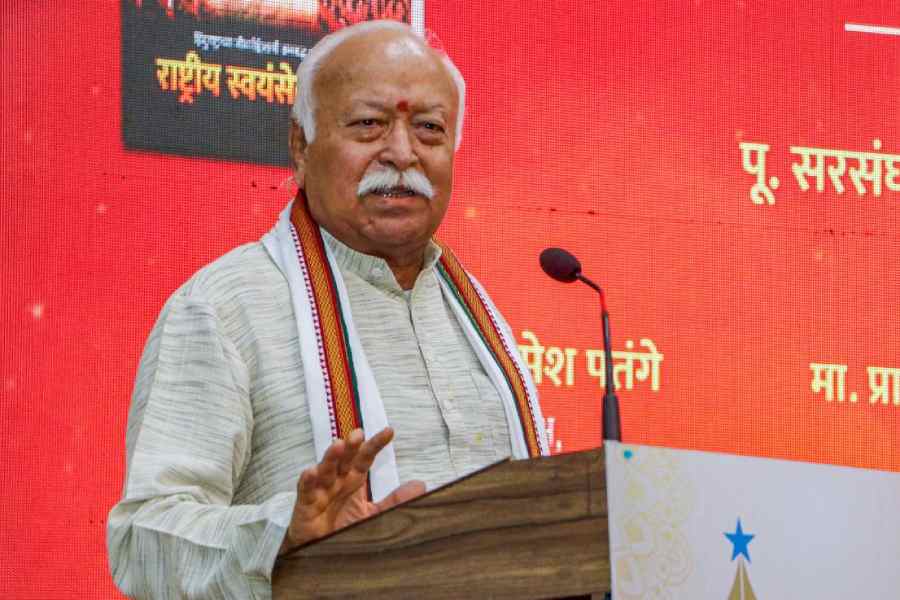A sadhu considered close to Prime Minister Narendra Modi and Uttar Pradesh chief minister Yogi Adityanath has said that RSS chief Mohan Bhagwat and the outfit don’t represent the Hindu community and his remarks on mosque-temple disputes are unacceptable.
Swami Rambhadracharya, the founder of Jagadguru Rambhadracharya Handicapped University in Chitrakoot and the Tulsi Peeth religious and social service institution, was responding to reporters’ questions on Bhagwat’s remarks against the controversies being raked up by Hindutva groups after the construction of the Ram temple in Ayodhya. The groups have claimed that mosques were built by Muslim invaders by decimating temples and flooded courts with petitions for reclamation.
“I don’t accept Bhagwat’s unfortunate statement. He didn’t say anything good. He has to follow us but there is no need for us to follow his ideas,” Rambhadracharya, who was awarded the Padma Vibhushan in 2015, said.
“Is Mohan Bhagwat a thekedar (defender) of the Hindu religion? The Sanatan religion will be guided by the sadhus and not by him. He may be the leader of a group but not the representative of Hindus of India,” the sadhu, who had deposed as an expert witness in 2003 before Allahabad High Court in the Ram Janmabhoomi-Babri Masjid dispute, said. Later in the Supreme Court, he had iterated his claim that Lord Ram was born in Ayodhya.
Rambhadracharya, who is also a Sanskrit scholar and poet, frequently shares the stage with Modi and Adityanath.
Bhagwat had in Pune last week batted for an inclusive society and said the world needed to be shown that the country could live in harmony, disapproving of a rising trend, particularly in Uttar Pradesh, to allege that Mughal-era mosques had come up by razing temples.
“New disputes are raked up every day. How can this be allowed? This shouldn’t continue. India needs to show that we can live together,” Bhagwat had said.
“There was a need for a Ram temple and it was built there in Ayodhya. But creating discord and enmity in the name of new issues every day must not happen. We should show the world that we can live in harmony,” he had added.
Rambhadracharya, who is visually challenged, alleged that Bhagwat was influenced by the politics of appeasement. “The RSS works according to the Hindu religion, the Hindu religion doesn’t work according to the RSS. We will take possession of all those places where the remains of our temples are found,” Rambhadracharya said.
Bhagwat’s remarks were viewed by many as a warning to Adityanath, whose government is allegedly encouraging those who are filing court cases demanding surveys of mosques that they claim were built after demolishing temples. In most cases, the district administrations in Uttar Pradesh appear to be siding with the Hindus.
Adityanath had also disapproved of Bhagwat’s message of harmony and appeared adamant about moving forward with his Hindu supremacy agenda.
Without taking Bhagwat’s name, Adityanath had said in a meeting in Ayodhya on December 20: “I want to ask you who were those people who harmed the symbols of Sanatan in the past? What was their intention? They conspired to make the entire earth a hell.” He cited the examples of the Kashi Vishwanath temple in Varanasi, Ram Janmabhoomi in Ayodhya, Krishna Janmbhoomi in Mathura and the prophecy that Vishnu’s future incarnation as Kalki would be born in Sambhal.
“I would say that only Sanatan Dharma can bring peace across the world. Sanatan Dharma is the national religion of Bharat. Bharat will remain till there is Sanatan Dharma. We all should work together to protect it,” Adityanath said, appearing to take an exclusionist approach on religion.











